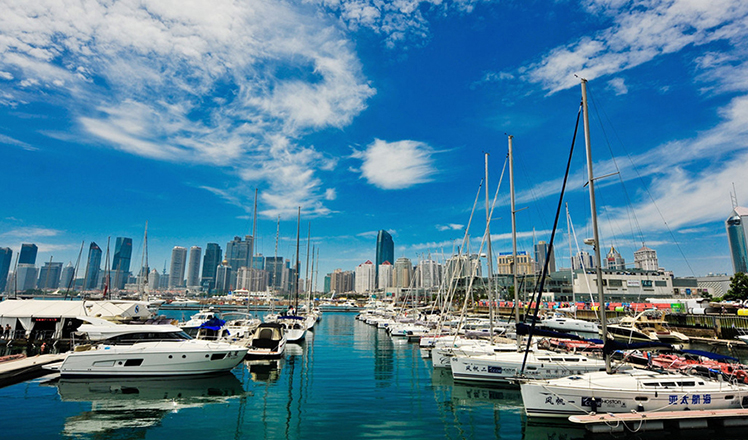History and law back China's sovereignty
Updated: 2016-07-14 07:51
(China Daily)
|
||||||||
106. The Philippines has repeatedly infringed China's maritime rights and interests in an attempt to expand and entrench its illegal claims in the South China Sea. These actions have grossly violated China's sovereignty and rights and interests in the South China Sea. By doing so, the Philippines has seriously violated its own commitment made under the DOC to exercise self-restraint in the conduct of activities that would complicate or escalate disputes. By firing upon Chinese fishing boats and fishermen, illegally seizing and detaining Chinese fishermen, giving them inhumane treatment and robbing them of their property, the Philippines has gravely infringed upon the personal and property safety and the dignity of Chinese fishermen and blatantly trampled on their basic human rights.
iii. The Philippines also has territorial pretensions on China's Huangyan Dao
107. The Philippines also has territorial pretensions on China's Huangyan Dao and attempted to occupy it illegally.
108. Huangyan Dao is China's inherent territory, over which China has continuously, peacefully and effectively exercised sovereignty and jurisdiction.
109. Before 1997, the Philippines had never challenged China's sovereignty over Huangyan Dao, nor had it laid any territorial claim to it. On 5 February 1990, Philippine Ambassador to Germany Bienvenido A. Tan, Jr. stated in a letter to German HAM radio amateur Dieter Löffler that, "According to the Philippine National Mapping and Resource Information Authority, the Scarborough Reef or Huangyan Dao does not fall within the territorial sovereignty of the Philippines."
110. A "Certification of Territorial Boundary of the Republic of the Philippines", issued by the Philippine National Mapping and Resource Information Authority on 28 October 1994, stated that "the territorial boundaries and sovereignty of the Republic of the Philippines are established in Article III of the Treaty of Paris signed on December 10, 1898", and confirmed that the "Territorial Limits shown in the official Map No. 25 issued by the Department of Environment and Natural Resources through the National Mapping and Resource Information Authority, are fully correct and show the actual status". As described above, the Treaty of Paris and other two treaties define the territorial limits of the Philippines, and China's Huangyan Dao clearly lies outside those limits. Philippine Official Map No. 25 reflects this. In a letter dated 18 November 1994 to the American Radio Relay League, Inc., the Philippine Amateur Radio Association, Inc. wrote that, "one very important fact remains, the national agency concerned had stated that based on Article III of the Treaty of Paris signed on December 10, 1898, Scarborough Reef lies just outside the territorial boundaries of the Philippines".
111. In April 1997, the Philippines turned its back on its previous position that Huangyan Dao is not part of the Philippine territory. The Philippines tracked, monitored and disrupted an international radio expedition on Huangyan Dao organized by the Chinese Radio Sports Association. In disregard of historical facts, the Philippines laid its territorial claim to Huangyan Dao on the grounds that it is located within the 200-nautical-mile exclusive economic zone claimed by the Philippines. In this regard, China made representations several times to the Philippines, pointing out explicitly that Huangyan Dao is China's inherent territory and that the Philippines' claim is groundless, illegal and void.
112. On 17 February 2009, the Philippine Congress passed Republic Act No. 9522. That act illegally includes into the Philippines' territory China's Huangyan Dao and some islands and reefs of Nansha Qundao. China immediately made representations to the Philippines and issued a statement, reiterating China's sovereignty over Huangyan Dao, Nansha Qundao and the adjacent waters, and declaring in explicit terms that any territorial claim over them made by any other country is illegal and void.
113. On 10 April 2012, the Philippines' naval vessel BRP Gregorio del Pilar (PF-15) intruded into the adjacent waters of China's Huangyan Dao, illegally seized Chinese fishermen and fishing boats operating there and treated the fishermen in a grossly inhumane manner, thus deliberately causing the Huangyan Dao Incident. In response to the Philippines' provocation, China immediately made multiple strong representations to Philippine officials in Beijing and Manila to protest the Philippines' violation of China's territorial sovereignty and harsh treatment of Chinese fishermen, and demanded that the Philippines immediately withdraw all its vessels and personnel. The Chinese government also promptly dispatched China Maritime Surveillance and China Fisheries Law Enforcement vessels to Huangyan Dao to protect China's sovereignty and rescue the Chinese fishermen. In June 2012, after firm representations repeatedly made by China, the Philippines withdrew relevant vessels and personnel from Huangyan Dao.
114. The Philippines' claim of sovereignty over China's Huangyan Dao is completely baseless under international law. The illegal claim that "Huangyan Dao is within the Philippines' 200-nautical-mile exclusive economic zone so it is Philippine territory" is a preposterous and deliberate distortion of international law. By sending its naval vessel to intrude into Huangyan Dao's adjacent waters, the Philippines grossly violated China's territorial sovereignty, the Charter of the United Nations and fundamental principles of international law. By instigating mass intrusion of its vessels and personnel into waters of Huangyan Dao, the Philippines blatantly violated China's sovereignty and sovereign rights therein. The Philippines' illegal seizure of Chinese fishermen engaged in normal operations in waters of Huangyan Dao and the subsequent inhumane treatment of them are gross violations of their dignity and human rights.
iv. The Philippines' unilateral initiation of arbitration is an act of bad faith
115. On 22 January 2013, the then government of the Republic of the Philippines unilaterally initiated the South China Sea arbitration. In doing so, the Philippines has turned its back on the consensus reached and repeatedly reaffirmed by China and the Philippines to settle through negotiation the relevant disputes in the South China Sea and violated its own solemn commitment in the DOC. Deliberately packaging the relevant disputes as mere issues concerning the interpretation or application of UNCLOS while knowing full well that territorial disputes are not subject to UNCLOS and that maritime delimitation disputes have been excluded from the UNCLOS compulsory dispute settlement procedures by China's 2006 declaration, the Philippines has wantonly abused the UNCLOS dispute settlement procedures. This initiation of arbitration aims not to settle its disputes with China, but to deny China's territorial sovereignty and maritime rights and interests in the South China Sea. This course of conduct is taken out of bad faith.
116. First, by unilaterally initiating arbitration, the Philippines has violated its standing agreement with China to settle the relevant disputes through bilateral negotiation. In relevant bilateral documents, China and the Philippines have agreed to settle through negotiation their disputes in the South China Sea and reaffirmed this agreement many times. China and the Philippines made solemn commitment in the DOC to settle through negotiation relevant disputes in the South China Sea, which has been repeatedly affirmed in bilateral documents. The above bilateral documents between China and the Philippines and relevant provisions in the DOC are mutually reinforcing and constitute an agreement in this regard between the two states. By this agreement, they have chosen to settle the relevant disputes through negotiation and to exclude any third party procedure, including arbitration. Pacta sunt servanda. This fundamental norm of international law must be observed. The Philippines' breach of its own solemn commitment is a deliberate act of bad faith. Such an act does not generate any right for the Philippines, nor does it impose any obligation on China.
117. Second, by unilaterally initiating arbitration, the Philippines has violated China's right to choose means of dispute settlement of its own will as a state party to UNCLOS. Article 280 of Part XV of UNCLOS stipulates: "Nothing in this Part impairs the right of any States Parties to agree at any time to settle a dispute between them concerning the interpretation or application of this Convention by any peaceful means of their own choice." Article 281 of UNCLOS provides: "If the States Parties which are parties to a dispute concerning the interpretation or application of this Convention have agreed to seek settlement of the dispute by a peaceful means of their own choice, the procedures provided for in this Part apply only where no settlement has been reached by recourse to such means and the agreement between the parties does not exclude any further procedure". Given that China and the Philippines have made an unequivocal choice to settle through negotiation the relevant disputes, the compulsory third-party dispute settlement procedures under UNCLOS do not apply.
118. Third, by unilaterally initiating arbitration, the Philippines has abused the UNCLOS dispute settlement procedures. The essence of the subject-matter of the arbitration initiated by the Philippines is an issue of territorial sovereignty over some islands and reefs of Nansha Qundao, and the resolution of the relevant matters also constitutes an integral part of maritime delimitation between China and the Philippines. Land territorial issues are not regulated by UNCLOS. In 2006, pursuant to Article 298 of UNCLOS, China made an optional exceptions declaration excluding from the compulsory dispute settlement procedures of UNCLOS disputes concerning, among others, maritime delimitation, historic bays or titles, military and law enforcement activities. Such declarations made by about 30 states, including China, form an integral part of the UNCLOS dispute settlement mechanism. By camouflaging its submissions, the Philippines deliberately circumvented the optional exceptions declaration made by China and the limitation that land territorial disputes are not subject to UNCLOS, and unilaterally initiated the arbitration. This course of conduct constitutes an abuse of the UNCLOS dispute settlement procedures.
119. Fourth, in order to push forward the arbitral proceedings, the Philippines has distorted facts, misinterpreted laws and concocted a pack of lies:
-The Philippines, fully aware that its submissions concern China's territorial sovereignty in the South China Sea, and that territorial issue is not subject to UNCLOS, deliberately mischaracterizes and packages the relevant issue as those concerning the interpretation or application of UNCLOS;
-The Philippines, fully aware that its submissions concern maritime delimitation, and that China has made a declaration, pursuant to Article 298 of UNCLOS, excluding disputes concerning, among others, maritime delimitation from the UNCLOS third-party dispute settlement procedures, intentionally detaches the diverse factors that shall be taken into consideration in the process of a maritime delimitation and treat them in an isolated way, in order to circumvent China's optional exceptions declaration;
-The Philippines deliberately misrepresents certain consultations with China on maritime affairs and cooperation, all of a general nature, as negotiations over the subject-matters of the arbitration, and further claims that bilateral negotiations therefore have been exhausted, despite the fact that the two states have never engaged in any negotiation on those subject-matters;
-The Philippines claims that it does not seek a determination of any territorial issue or a delimitation of any maritime boundary, and yet many times in the course of the arbitral proceedings, especially during the oral hearings, it denies China's territorial sovereignty and maritime rights and interests in the South China Sea;
-The Philippines turns a blind eye to China's consistent position and practice on the South China Sea issue, and makes a completely false assertion that China lays an exclusive claim of maritime rights and interests to the entire South China Sea;
-The Philippines exaggerates Western colonialists' role in the South China Sea in history and denies the historical facts and corresponding legal effect of China's longstanding exploration, exploitation and administration in history of relevant waters of the South China Sea;
-The Philippines puts together some remotely relevant and woefully weak pieces of evidence and makes far-fetched inferences to support its submissions;
-The Philippines, in order to make out its claims, arbitrarily interprets rules of international law, and resorts to highly controversial legal cases and unauthoritative personal opinions in large quantity.
120. In short, the Philippines' unilateral initiation of arbitration contravenes international law including the UNCLOS dispute settlement mechanism. The Arbitral Tribunal in the South China Sea arbitration established at the Philippines' unilateral request has, ab initio, no jurisdiction, and awards rendered by it are null and void and have no binding force. China's territorial sovereignty and maritime rights and interests in the South China Sea shall under no circumstances be affected by those awards. China does not accept or recognize those awards. China opposes and will never accept any claim or action based on those awards.
V. China's Policy on the South China Sea Issue
121. China is an important force for maintaining peace and stability in the South China Sea. It abides by the purposes and principles of the Charter of the United Nations and is committed to upholding and promoting international rule of law. It respects and acts in accordance with international law. While firmly safeguarding its territorial sovereignty and maritime rights and interests, China adheres to the position of settling disputes through negotiation and consultation and managing differences through rules and mechanisms. China endeavors to achieve win-win outcomes through mutually beneficial cooperation, and is committed to making the South China Sea a sea of peace, cooperation and friendship.
122. China is committed to maintaining peace and stability in the South China Sea with other countries in the region and upholding the freedom of navigation and overflight in the South China Sea enjoyed by other countries under international law. China urges countries outside this region to respect the efforts in this regard by countries in the region and to play a constructive role in maintaining peace and stability in the South China Sea.
i. On the territorial issues concerning Nansha Qundao
123. China is firm in upholding its sovereignty over Nanhai Zhudao and their surrounding waters. Some countries have made illegal territorial claims over and occupied by force some islands and reefs of Nansha Qundao. These illegal claims and occupation constitute gross violations of the Charter of the United Nations and basic norms governing international relations. They are null and void. China consistently and resolutely opposes such actions and demands that relevant states stop their violation of China's territory.
124. China has spared no efforts to settle, on the basis of respecting historical facts, relevant disputes with the Philippines and other countries directly concerned, through negotiation in accordance with international law.
125. It is universally recognized that land territorial issues are not regulated by UNCLOS. Thus, the territorial issue in Nansha Qundao is not subject to UNCLOS.
ii. On maritime delimitation in the South China Sea
126. China maintains that the issue of maritime delimitation in the South China Sea should be settled equitably through negotiation with countries directly concerned in accordance with international law, including UNCLOS. Pending the final settlement of this issue, all relevant parties must exercise self-restraint in the conduct of activities that may complicate or escalate disputes and affect peace and stability.
127. When ratifying UNCLOS in 1996, China stated that, "The People's Republic of China will effect, through consultations, the delimitation of the boundary of the maritime jurisdiction with the States with coasts opposite or adjacent to China respectively on the basis of international law and in accordance with the principle of equitability." China's positions in this regard are further elaborated in the 1998 Law of the People's Republic of China on the Exclusive Economic Zone and the Continental Shelf. This Law provides that, "The People's Republic of China shall determine the delimitation of its exclusive economic zone and continental shelf in respect of the overlapping claims by agreement with the states with opposite or adjacent coasts, in accordance with the principle of equitability and on the basis of international law", and that, "The provisions in this law shall not affect the historical rights that the People's Republic of China has been enjoying ever since the days of the past".
- Arbitration body 'has nothing to do' with us, says UN
- Trump expected to make VP announcement on Friday
- 25 killed, 50 injured as trains collide in Italy
- The South China Sea Arbitration: Illegal, Illegitimate and Invalid
- Theresa May set to be UK's next Prime Minister after rival stands down
- Killing of UN Chinese peacekeepers slamed

 Coming-of-Age Day on the frontline of fighting floods
Coming-of-Age Day on the frontline of fighting floods
 Monks seek tranquility inside lotus ponds
Monks seek tranquility inside lotus ponds
 In pics: Top 10 livable Chinese cities
In pics: Top 10 livable Chinese cities
 Restaurant of 'bandits' opens in Northeast China's Jilin
Restaurant of 'bandits' opens in Northeast China's Jilin
 Ivanovic, Schweinsteiger holds wedding in Venice
Ivanovic, Schweinsteiger holds wedding in Venice
 Tim Duncan announces retirement after 19 seasons with Spurs
Tim Duncan announces retirement after 19 seasons with Spurs
 Merchandize for Rio 2016 a hit in run-up to games
Merchandize for Rio 2016 a hit in run-up to games
 Top 10 best Chinese cities to own a house
Top 10 best Chinese cities to own a house
Most Viewed
Editor's Picks

|

|

|

|

|

|
Today's Top News
Ministry slams US-Korean THAAD deployment
Two police officers shot at protest in Dallas
Abe's blame game reveals his policies failing to get results
Ending wildlife trafficking must be policy priority in Asia
Effects of supply-side reform take time to be seen
Chinese State Councilor Yang Jiechi to meet Kerry
Chinese stocks surge on back of MSCI rumors
Liang avoids jail in shooting death
US Weekly

|

|









